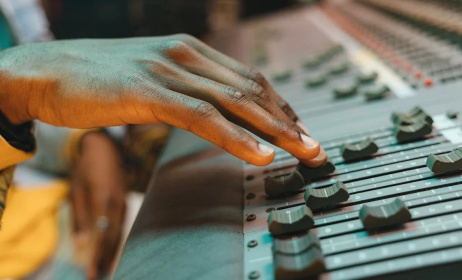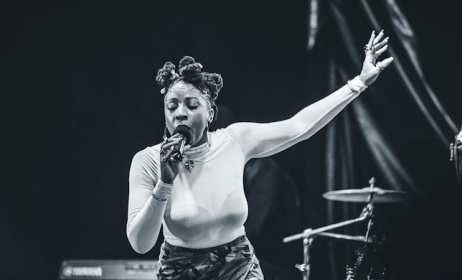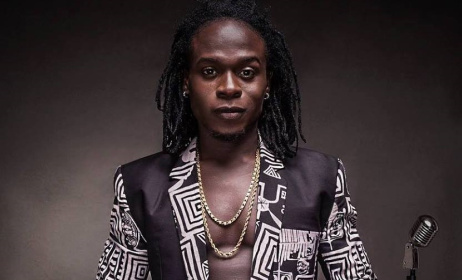Classical music in Cameroon
By Adeline Tchouakak
Classical music in Cameroon is like an obstacle course. Choirs and loyal fans of this genre are struggling to keep it alive with limited resources. This text provides an overview of the subject.
 Classical instruments. Photo: www.vinyculture.com
Classical instruments. Photo: www.vinyculture.com
Origins
In Cameroon, three-, four- or even eight-voice singing in cathedrals has typically been accompanied by keyboards; not a full orchestra. In 1843, protestant missionaries led by Joseph Merrick brought modern music to Cameroon. With 11th century Italian monk Guido d’Arezzo being credited as the inventor of musical notation, classical music was therefore extremely religious and taught only in churches.
Local inhabitants of Cameroon, being used to traditional singing and instruments such as tom-toms, drums, mvets (a string instrument from the Fang-Beti peoples), shakers and balafons to praise God, couldn’t take it. According to Ange Cécile Ndzengue, choirmaster of the Classical Choir of Yaoundé, which her father Mr. Elle Ntonga co-founded in 1969: "Our ancestors thought this music was too complicated, they preferred the simple chants they knew that didn’t require any particular training, as classical music does."
Still, priests and pastors refused to give up. They started by teaching how to sing in unison, then in two, three and finally four voices. They also taught music theory and Christians started to get used to it. Bach’s oratorios were sang during Eucharistic celebrations, as were Handel’s ‘Messiah’ and some of Mozart’s work as well. Some choirs specialized in Gregorian chants and were trained in Catholic churches. Gradually, churches and temples were established with both traditional and classical choirs in each parish, staging performances at special occasions.
Education and training
Today, the works of Vivaldi, Beethoven, Mendelssohn, Verdi and many other European masters have been mastered by classical choirs in Cameroon. Among these are the Madrigal Choir, the Great Classical Choir of Yaoundé Cathedral, the Choir of the University of Douala, le Chœur de la Fraternité (the Fraternity Choir) and le Chœur du Diapason (Tuning Fork Choir). These choirs perform during masses, at concerts, weddings, funerals and sometimes at official ceremonies.
Choir member Hyacinthe says: "I have never been to a conservatoire, but by reading scores, listening to CDs and watching videos, I can practice by imitating my idols such as Andrea Bocelli."
According to choirmaster Jean Eric Bitang of the University of Douala, this is how choirs are trained: "We don’t have a conservatoire in Cameroon. The best way to learn is by searching online for singing techniques, vocalizations, different ways of interpreting these masterpieces and how to compose songs."
Various associations allow choirs to get training, such as Le Métronome (The Metronome), led by pianist Théophile Désiré Aboudi, and Arbre à Musique (Music Tree), under the direction of musicologist Raymond Pende. Aboudi was trained by French pianist Hildegarde Fesneau, and Pende studied in France. They both offer training sessions all year round, with ‘master classes’ led by representatives of European conservatoires. Young children can also learn music theory and how to play the piano, flute, violin, guitar and how to sing. For example, Françoise Ferrand, pianist and choirmaster of the Paris Conservatoire, recently taught piano classes in Cameroon, accompanied by local baritone Florent Mbia, who also led a singing class.
Other Cameroonian choir singers who got the opportunity to go study outside the country have come back to share their experience with their counterparts, such as bass singer Jacques Greg Belobo (former member of the Classical Choir of Yaounde), who now performs on stages all around the world, and baritone Clou L’Avenir Belingui, who trained with the Philharmonic Choir in Lagos, Nigeria.
An independent choir named Festy Classic Group was created for annual Christmas events for children. There are also opera singing and piano contests in each diocesan area, the most popular being Aguimucla (Association of Classical music). These initiatives aim to eventually open a conservatoire in Cameroon, which is not yet part of the government’s furute projects.
Obstacles
Apart from traning and practice, choir singers don’t have anywhere to express themselves. Most classical choirs in Cameroon only perform in churches. Some can afford a once-a-year show in a nice venue. With on average of two keyboards to accompany them, they all sing and play out of love for music, rather than money. "Most times, if we are hired for private events, we asually get about 100 000 CFA francs (about US$165), which once divided equals 2000 CFA francs ($3.30) per person for the day," says choirmaster Ange Cécile Ndzengue of the Classical Choir of Yaoundé.
Unfortunately, most people don’t support the choirs’ efforts. Only choirs members and aficionados attend the concerts because most think it’s purely religious music.
There are many reasons behind this lack of interest. "Many think classical music is exclusive to religious people or to the bourgoisie. Considering that the majority of people in Cameroon are quite poor, it’s easy to understand why people are reluctant," says Clou L’Avenir Belingui, choirmaster of the Festy Classic Group.
Despite this disdain and insecurity, a few notable talents have emerged and flourished through their compositions, such as the late Daniel Doumbe Eyango, Gaspard Mbole, Jules Tékam, Jean Eric Bitang and others. Others have focussed on popular local songs, such as Patrick Ewoungouo, the late René Esso and Raphael Tchomnou, among others.
Many young classical musicians in Cameroon, despite strong will and determination, desperately lack proper techniques and training to hone their talents. Despite its potential and talent, classical music in Cameroon still has a long way to go before it can be said to achieve mainstream popularity.



























Commentaires
s'identifier or register to post comments